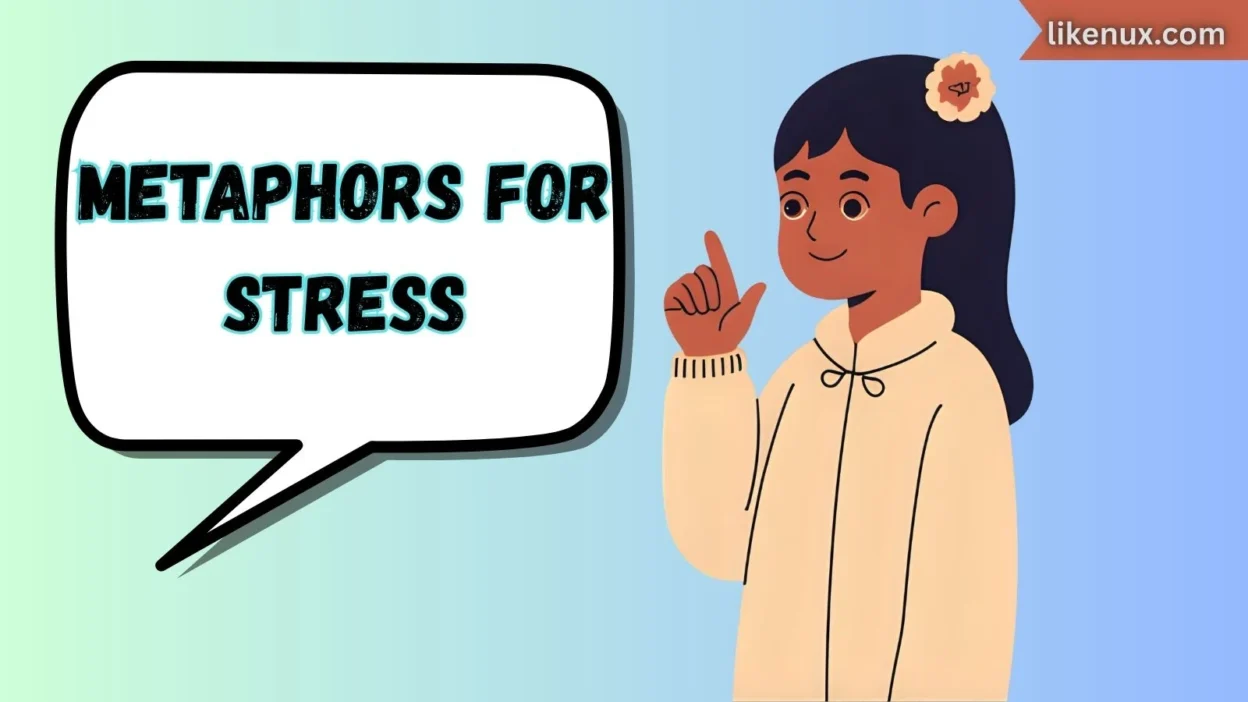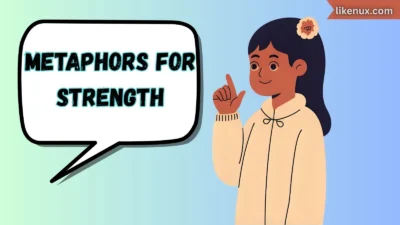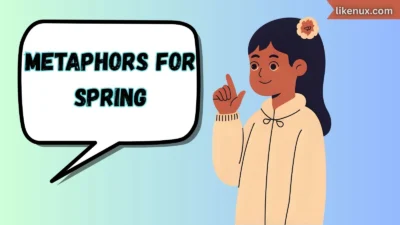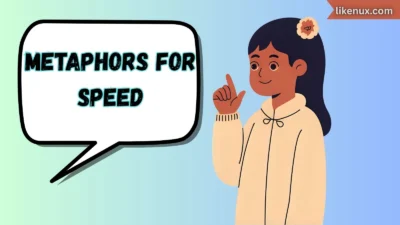Stress is something we’ve all felt—sometimes it’s like a quiet hum in the background, and other times it feels overwhelming. Stress can be hard to explain, but using metaphors makes it easier to put feelings into words. When we find the right metaphor, it not only helps us express ourselves better but also allows others to truly understand what we’re going through. Metaphors for Stress.
In this article, we’ll explore 25 warm and thoughtful metaphors for stress. Each one will give you a simple meaning, an example sentence, the best use, and alternative phrases you can use. This guide is designed with care, blending personal experience, expertise, and helpful insights—because stress is something I’ve worked through myself, and I know how important it is to feel understood.
1. Stress is a Heavy Backpack
Meaning: Carrying stress feels like lugging around a load that weighs you down.
In a sentence: “Lately, stress feels like a heavy backpack I can’t put down.”
Best use: To describe ongoing responsibilities or worries.
Other ways to say: burden, load, weight on my shoulders.
Read More: Metaphors for Strong
2. Stress is a Storm Cloud
Meaning: Stress hovers and blocks out clarity, like a dark cloud before a storm.
In a sentence: “I feel like a storm cloud is hanging over me today.”
Best use: For temporary stress that feels overwhelming.
Other ways to say: gloomy mood, overshadowed, clouded mind.
3. Stress is a Ticking Clock
Meaning: The pressure of time and deadlines builds up stress.
In a sentence: “Stress feels like a ticking clock counting down too fast.”
Best use: For work or school deadlines.
Other ways to say: racing against time, countdown pressure.
4. Stress is a Tight Rope
Meaning: Stress makes you feel like you’re balancing carefully with no room for error.
In a sentence: “Every day feels like walking a tight rope of stress.”
Best use: When describing fragile balance in life.
Other ways to say: on edge, walking a fine line, fragile balance.
5. Stress is a Pressure Cooker
Meaning: Stress builds inside until it’s about to burst.
In a sentence: “I’ve been a pressure cooker of stress lately.”
Best use: To describe internal tension building up.
Other ways to say: bottled-up emotions, ready to explode, boiling point.
6. Stress is a Tangled Knot
Meaning: Stress feels messy and hard to unravel.
In a sentence: “My thoughts are a tangled knot of stress.”
Best use: To describe confusion or overthinking.
Other ways to say: twisted mess, mental snarl, jumble.
7. Stress is Carrying Stones in Your Pocket
Meaning: Small but constant worries weigh you down over time.
In a sentence: “It’s like carrying stones of stress everywhere I go.”
Best use: For everyday, low-level stress.
Other ways to say: emotional baggage, small burdens, drag.
8. Stress is a Tight Band Around the Chest
Meaning: Stress feels suffocating and restrictive.
In a sentence: “My stress is like a tight band squeezing my chest.”
Best use: For physical symptoms of stress.
Other ways to say: constricted, suffocating, heavy chest.
9. Stress is a Maze
Meaning: Stress makes you feel lost and unsure of the way forward.
In a sentence: “I’m stuck in a maze of stress with no exit in sight.”
Best use: When describing confusion and lack of direction.
Other ways to say: lost, trapped, disoriented.
10. Stress is a Broken Record
Meaning: Stress keeps playing the same worries in your head.
In a sentence: “My mind is a broken record of stress and worries.”
Best use: For repetitive thoughts.
Other ways to say: replaying worries, looping thoughts, mental cycle.
11. Stress is a Tight Collar
Meaning: Stress feels like something is choking or restricting you.
In a sentence: “This stress is like wearing a tight collar I can’t remove.”
Best use: For workplace or social pressures.
Other ways to say: choking, stifling, pinned down.
12. Stress is Quick Sand
Meaning: The harder you fight stress, the deeper you sink.
In a sentence: “Dealing with stress feels like quicksand pulling me in.”
Best use: For situations that worsen with overthinking.
Other ways to say: dragged down, stuck, sinking feeling.
13. Stress is a Spinning Wheel
Meaning: Stress makes your thoughts go in endless circles.
In a sentence: “My brain is a spinning wheel of stress.”
Best use: For sleepless nights or overthinking.
Other ways to say: racing thoughts, hamster wheel, nonstop cycle.
14. Stress is Fire in the Chest
Meaning: Stress burns inside, creating restlessness.
In a sentence: “My stress feels like fire burning inside my chest.”
Best use: For describing intense anxiety.
Other ways to say: burning nerves, agitation, inner flames.
15. Stress is a Shadow
Meaning: Stress follows you everywhere, even when you try to escape.
In a sentence: “This stress is a shadow that won’t leave my side.”
Best use: For lingering stress.
Other ways to say: unwanted companion, always present, dark presence.
16. Stress is a Cage
Meaning: Stress makes you feel trapped and limited.
In a sentence: “Stress is a cage that keeps me from living freely.”
Best use: For suffocating situations.
Other ways to say: imprisoned, trapped, confined.
17. Stress is a Heavy Blanket
Meaning: Stress feels smothering and draining.
In a sentence: “Stress feels like a heavy blanket over my life.”
Best use: For emotional exhaustion.
Other ways to say: smothered, weighed down, drained.
18. Stress is a Constant Buzz
Meaning: Stress lingers like an annoying background noise.
In a sentence: “There’s a constant buzz of stress in my head.”
Best use: For low-level but persistent anxiety.
Other ways to say: background noise, mental hum, nagging worry.
19. Stress is a Storm at Sea
Meaning: Stress tosses you around like waves in a storm.
In a sentence: “I’m caught in a storm of stress I can’t control.”
Best use: For chaotic life moments.
Other ways to say: emotional waves, turbulence, stormy waters.
20. Stress is a Locked Door
Meaning: Stress makes solutions feel out of reach.
In a sentence: “Stress feels like banging on a locked door with no key.”
Best use: For frustration when stuck.
Other ways to say: blocked path, no way out, barrier.
21. Stress is a Balloon About to Pop
Meaning: Stress builds until you’re ready to burst.
In a sentence: “I feel like a balloon of stress about to pop.”
Best use: For moments of overwhelm.
Other ways to say: on edge, reaching the limit, ready to snap.
22. Stress is Carrying the World on Your Shoulders
Meaning: Stress feels like bearing enormous responsibility.
In a sentence: “Sometimes stress is like carrying the whole world on my shoulders.”
Best use: For leadership or caregiving stress.
Other ways to say: Atlas burden, heavy responsibility, too much weight.
23. Stress is a Raging River
Meaning: Stress rushes and overwhelms, making it hard to stay steady.
In a sentence: “I’m swept away in a raging river of stress.”
Best use: For sudden, intense stress.
Other ways to say: flood of emotions, swept away, overpowering tide.
24. Stress is a Puzzle Missing Pieces
Meaning: Stress makes life feel incomplete and confusing.
In a sentence: “My stress is like a puzzle with missing pieces.”
Best use: For lack of clarity in decisions.
Other ways to say: unfinished, incomplete, scattered.
25. Stress is a Mountain to Climb
Meaning: Stress makes challenges feel tall and difficult.
In a sentence: “This stress feels like climbing a mountain with no end.”
Best use: For long-term struggles.
Other ways to say: uphill battle, steep climb, hard road.
FAQs about Stress Metaphors
1. Why are metaphors helpful in describing stress?
Metaphors make abstract feelings easier to understand and communicate. They help others relate to your experiences.
2. Which metaphor is best for workplace stress?
“The ticking clock” or “pressure cooker” often resonate well for work-related stress.
3. Can metaphors help reduce stress?
Yes. By naming your stress in a metaphor, you can separate it from yourself, making it easier to manage.
4. Are these metaphors suitable for professional writing?
Absolutely. With the right tone, they can be powerful in essays, blogs, or mental health discussions.
5. How do I choose the right metaphor?
Pick one that feels closest to your personal experience—everyone’s stress shows up differently.
Conclusion
Stress is a universal experience, but finding the right words to describe it makes a difference. These 25 metaphors for stress give you meaningful ways to express what you’re going through, whether it’s the heavy backpack of responsibilities or the stormy sea of emotions.
From my own journey, I’ve learned that naming stress is the first step to easing it. When you can explain it—whether to a friend, therapist, or even yourself—it feels a little lighter. Use these metaphors not just to describe your stress, but also as a tool to connect, share, and heal.

Daniel Matthew is a passionate visionary who believes in creativity, purpose, and innovation. With a focus on growth and authenticity, he turns every idea into meaningful impact.



